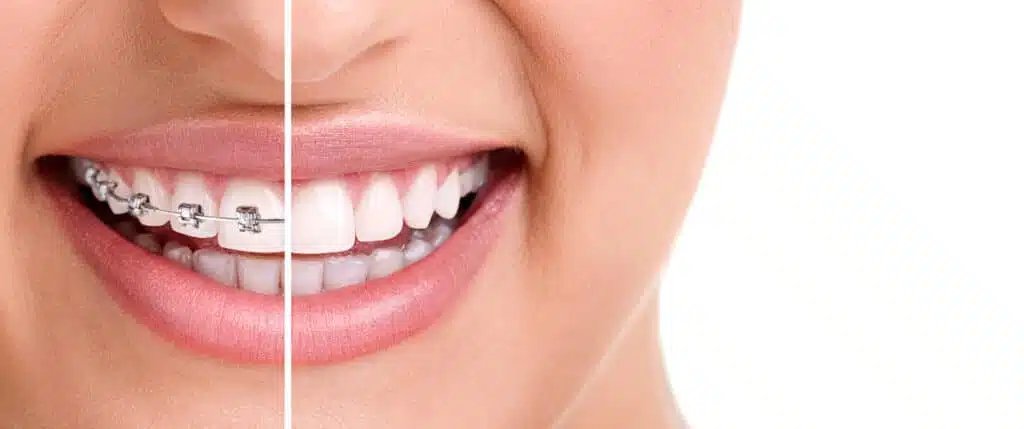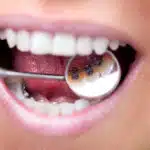How much does a brace cost? Here we give you an overview of the braces costs that are incurred for different methods.
Braces, also known as orthodontic appliances, are an effective method of correcting misaligned teeth and improving the bite.
But how much does a brace cost? In this article, we’ll take a close look at braces costs and the various factors that influence them.
| Get 150 € discount on your dental correction! |

Book a consultation appointment now at a nearby DrSmile partner practice and find out if teeth straightening with aligners is right for you.
The appointment is completely non-binding and does not involve any costs.
With the code “THATSMILE150” you will receive 150 € discount on the treatment.
What are the types of braces?
There are different types of braces that can be chosen depending on individual needs and preferences. The most common types are:
1. traditional metal braces
Traditional metal braces are the best known type of braces.
They consist of metal brackets that are bonded to the teeth and wire arches that gradually move the teeth into the correct position.
This type of braces is usually less expensive than other options, as they are covered by health insurance for children and adolescents, and in exceptional cases for adults.
2. ceramic braces
Ceramic braces are more inconspicuous than traditional metal braces because the brackets are made of transparent or colored ceramic material.
They offer similar effectiveness to metal braces, but are slightly more expensive due to the material used.
3. lingual braces
Lingual braces are placed on the inside of the teeth, making them virtually invisible from the outside.
They are a good option for those who want to wear their braces discreetly.
However, due to the complex manufacturing technique, lingual braces are usually more expensive than traditional braces.
4. invisible braces (aligners)
Invisible braces consist of transparent, custom-made splints that are placed over the teeth.
They are almost invisible and can be easily removed for eating and brushing teeth.
Since providers such as DrSmile use advanced technology, the cost of the invisible braces is usually lower than that of traditional braces.
5. self-ligating braces
Self-ligating braces use special brackets that do not require elastics or metal brackets.
This allows them to adjust independently and requires less frequent visits to the orthodontist.
Although they are slightly more expensive than traditional metal braces, they offer greater comfort and shorter treatment time.

How much does a brace cost? Factors influencing the price
The cost of braces depends on several factors. Here are some of the key influencing factors:
1. severity of the malocclusion
The severity of the malocclusion is one of the main factors affecting the cost of braces.
The more extensive the correction required, the longer the treatment will take and the higher the cost may be.
2. type of brace
As mentioned above, the cost can vary depending on the type of braces.
Traditional metal braces are usually the most cost-effective option, as they are covered by health insurance if medically indicated for children and adolescents, and in exceptional cases for adults.
Less expensive are usually also so-called aligners, such as the invisible braces from DrSmile.
3. treatment duration
The duration of treatment may also affect the cost.
More complex cases usually require longer treatment, which can lead to higher overall costs.
4. experience of the orthodontist
The experience and reputation of the orthodontist can also affect the cost.
An experienced orthodontist with high demand may charge higher fees.
| Get 150 € discount on your dental correction! |

Book a consultation appointment now at a nearby DrSmile partner practice and find out if teeth straightening with aligners is right for you.
The appointment is completely non-binding and does not involve any costs.
With the code “THATSMILE150” you will receive 150 € discount on the treatment.
Average cost of braces
The actual cost of braces can vary depending on the individual case, but here are some rough guidelines for average costs:
Cost of traditional metal braces
The cost of traditional metal braces is usually between €2,000 and €4,000.
Cost of ceramic braces
Ceramic braces are slightly more expensive and can cost between €3,000 and €5,500.
Cost of lingual braces
Lingual braces are usually the most expensive option and can cost between €5,000 and €9,000.
Cost of invisible braces (aligners)
The cost of invisible braces ranges from €1,600 to €6,500, depending on the provider.
The prices of the renowned provider DrSmile, for example, range from €1,790 to €3,990 – you can find more information about DrSmile prices here.
Cost of self-ligating braces
Self-ligating braces usually cost between €3,500 and €6,500.
Additional factors that influence the cost of braces
In addition to the actual braces cost, there are also some additional factors that should be considered:
Pretreatments
In some cases, pre-treatments may be required before the actual braces treatment.
This includes, for example, the removal of wisdom teeth or the performance of a professional dental cleaning.
These additional treatments can increase the overall cost.
Aftercare
After the braces are removed, follow-up treatment is always required to stabilize the achieved tooth position.
This may involve the use of a retainer or other post-treatment measures, which may incur additional costs.
Retainer costs
Retainers are special devices used after treatment to hold teeth in their new position.
The cost of retainers should be included in the total cost calculation.

Insurance and financing options
To help cover the cost of braces, there are several insurance and financing options that can be considered:
Health insurance
Some health insurance plans cover a portion of the cost of braces, especially if the treatment is medically necessary.
It is advisable to check the insurance conditions and contact the insurance company if necessary.
Supplementary dental insurance
Supplemental dental insurance can also help reduce the cost of braces.
These insurance plans provide special benefits for dental treatment, including orthodontics.
Installment and financing
Many orthodontists offer installment plans and financing options to help spread the cost of braces in a convenient way.
It is worth talking to your orthodontist about these options.
Conclusion on the topic: How much do braces cost?
The cost of braces can vary depending on the individual case and various factors.
It is important that you consult with an experienced orthodontist to get an accurate assessment of costs and treatment options.
Braces can be an investment in your long-term oral health and help you achieve a beautiful smile.
If you have further questions about the cost of braces or would like a personalized consultation, don’t hesitate to schedule an appointment with an orthodontist.
He can also take away your fear of treatment with braces.
A professional assessment is the best way to determine the treatment that is right for you and the associated braces cost.
| Get 150 € discount on your dental correction! |

Book a consultation appointment now at a nearby DrSmile partner practice and find out if teeth straightening with aligners is right for you.
The appointment is completely non-binding and does not involve any costs.
With the code “THATSMILE150” you will receive 150 € discount on the treatment.
FAQs on the topic: How much do braces cost?
At this point we will answer some frequently asked questions about the topic “How much do braces cost?
How long does braces treatment take?
The duration of braces treatment varies depending on the individual case, but can usually range from 1 to 3 years.
Can I adjust my braces myself?
No, it is important that brace adjustments are made by a qualified orthodontist.
Are there alternatives to conventional braces?
Yes, there are alternative treatments such as aligners or lingual braces that are more inconspicuous.
How often do I need to go to the orthodontist?
Regular visits are usually required every 4-6 weeks to adjust the braces and monitor progress. In contrast, regular visits are not necessary with most aligner providers.
How long do I have to wear a retainer?
The wearing time of a retainer varies, but can usually be several months to a few years to stabilize the achieved tooth position.



Leave a Reply